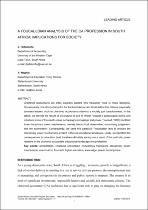| dc.contributor.author | Terblanche, Judith | |
| dc.contributor.author | Waghid, Yusef | |
| dc.date.accessioned | 2022-05-31T11:05:02Z | |
| dc.date.available | 2022-05-31T11:05:02Z | |
| dc.date.issued | 2020 | |
| dc.identifier.citation | Terblanche, J., & Waghid, Y. (2020). A Foucauldian analysis of the ca profession in South Africa: Implications for society. South African Journal of Higher Education,34(1), 1-17. http://dx.doi.org/10.20853/34-1-3893 | en_US |
| dc.identifier.issn | 1753-5913 | |
| dc.identifier.uri | http://dx.doi.org/10.20853/34-1-3893 | |
| dc.identifier.uri | http://hdl.handle.net/10566/7478 | |
| dc.description.abstract | Chartered accountants are often business leaders who frequently need to make decisions.
Consequently, it is of importance for the fractured democratic South Africa that citizens (especially
business leaders, such as chartered accountants) develop a socially just consciousness. In this
article, we provide the results of an analysis of one of Michel Foucault’s genealogical works, and
introduce some of Foucault’s views pertaining to knowledge and power. Foucault (1995) identified
three disciplinary power mechanisms, namely hierarchical observation, normalising judgement,
and the examination. Consequently, we used this particular Foucauldian lens to analyse the
disciplinary power mechanisms evident in the CA educational landscape. Lastly, we identified the
consequences for education (and therefore ultimately society) as a result of the particular power
relations in the chartered accountant educational landscape and profession. | en_US |
| dc.language.iso | en | en_US |
| dc.publisher | Stellenbosch University | en_US |
| dc.subject | Accreditation | en_US |
| dc.subject | Chartered accountant | en_US |
| dc.subject | Disciplinary power mechanisms | en_US |
| dc.subject | Higher education | en_US |
| dc.subject | Social justice | en_US |
| dc.title | A Foucauldian analysis of the ca profession in South Africa: Implications for society | en_US |
| dc.type | Article | en_US |

